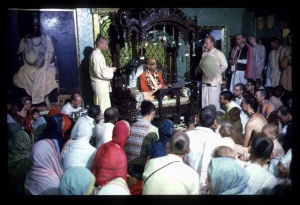BG 1.12: Difference between revisions
(Vanibot #0020 edit - link to the Version Compare feature) |
(Vanibot #0054 edit - transform synonyms into clickable links, which search similar occurrences) |
||
| Line 22: | Line 22: | ||
<div class="synonyms"> | <div class="synonyms"> | ||
''tasya'' | ''[//vanipedia.org/wiki/Special:VaniSearch?s=tasya&tab=syno_o&ds=1 tasya]'' — his; ''[//vanipedia.org/wiki/Special:VaniSearch?s=sañjanayan&tab=syno_o&ds=1 sañjanayan]'' — increasing; ''[//vanipedia.org/wiki/Special:VaniSearch?s=harṣam&tab=syno_o&ds=1 harṣam]'' — cheerfulness; ''[//vanipedia.org/wiki/Special:VaniSearch?s=kuru&tab=syno_o&ds=1 kuru]-[//vanipedia.org/wiki/Special:VaniSearch?s=vṛddhaḥ&tab=syno_o&ds=1 vṛddhaḥ]'' — the grandsire of the Kuru dynasty (Bhīṣma); ''[//vanipedia.org/wiki/Special:VaniSearch?s=pitāmahaḥ&tab=syno_o&ds=1 pitāmahaḥ]'' — the grandfather; ''[//vanipedia.org/wiki/Special:VaniSearch?s=siṁha&tab=syno_o&ds=1 siṁha]-[//vanipedia.org/wiki/Special:VaniSearch?s=nādam&tab=syno_o&ds=1 nādam]'' — roaring sound, like that of a lion; ''[//vanipedia.org/wiki/Special:VaniSearch?s=vinadya&tab=syno_o&ds=1 vinadya]'' — vibrating; ''[//vanipedia.org/wiki/Special:VaniSearch?s=uccaiḥ&tab=syno_o&ds=1 uccaiḥ]'' — very loudly; ''[//vanipedia.org/wiki/Special:VaniSearch?s=śaṅkham&tab=syno_o&ds=1 śaṅkham]'' — conchshell; ''[//vanipedia.org/wiki/Special:VaniSearch?s=dadhmau&tab=syno_o&ds=1 dadhmau]'' — blew; ''[//vanipedia.org/wiki/Special:VaniSearch?s=pratāpa&tab=syno_o&ds=1 pratāpa]-[//vanipedia.org/wiki/Special:VaniSearch?s=vān&tab=syno_o&ds=1 vān]'' — the valiant. | ||
</div> | </div> | ||
Latest revision as of 15:06, 17 February 2024

A.C. Bhaktivedanta Swami Prabhupada
TEXT 12
- तस्य सञ्जनयन्हर्षं कुरुवृद्धः पितामहः ।
- सिंहनादं विनद्योच्चैः शङ्खं दध्मौ प्रतापवान् ॥१२॥
- tasya sañjanayan harṣaṁ
- kuru-vṛddhaḥ pitāmahaḥ
- siṁha-nādaṁ vinadyoccaiḥ
- śaṅkhaṁ dadhmau pratāpavān
SYNONYMS
tasya — his; sañjanayan — increasing; harṣam — cheerfulness; kuru-vṛddhaḥ — the grandsire of the Kuru dynasty (Bhīṣma); pitāmahaḥ — the grandfather; siṁha-nādam — roaring sound, like that of a lion; vinadya — vibrating; uccaiḥ — very loudly; śaṅkham — conchshell; dadhmau — blew; pratāpa-vān — the valiant.
TRANSLATION
Then Bhīṣma, the great valiant grandsire of the Kuru dynasty, the grandfather of the fighters, blew his conchshell very loudly, making a sound like the roar of a lion, giving Duryodhana joy.
PURPORT
The grandsire of the Kuru dynasty could understand the inner meaning of the heart of his grandson Duryodhana, and out of his natural compassion for him he tried to cheer him by blowing his conchshell very loudly, befitting his position as a lion. Indirectly, by the symbolism of the conchshell, he informed his depressed grandson Duryodhana that he had no chance of victory in the battle, because the Supreme Lord Kṛṣṇa was on the other side. But still, it was his duty to conduct the fight, and no pains would be spared in that connection.